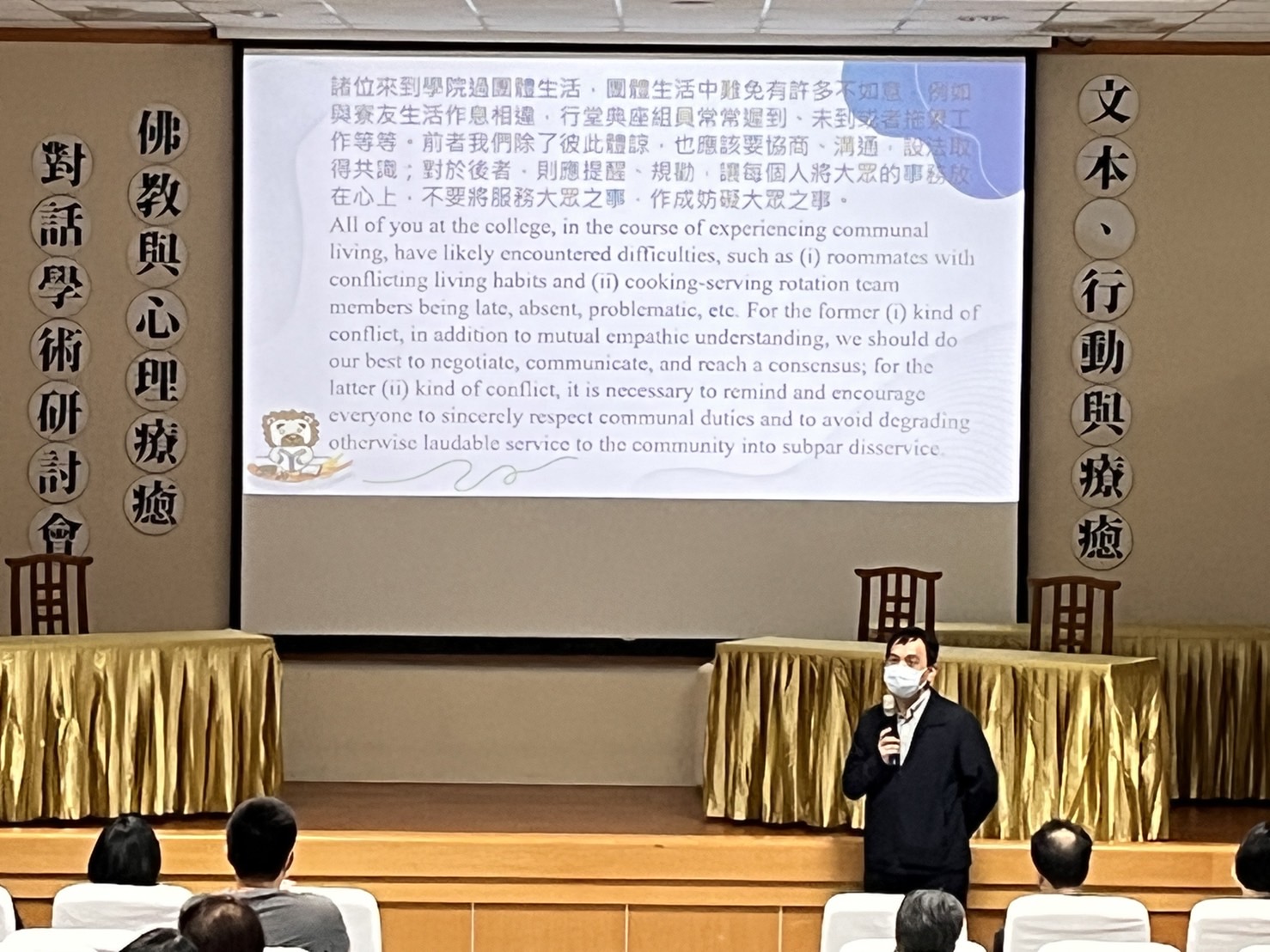2023/ 05 /24
诸位来到学院过团体生活,团体生活中难免有许多不如意,例如:与寮友生活作息相违,行堂典座组员常常迟到、未到或者拖累工作等等。前者我们除了彼此体谅,也应该要协商、沟通,设法取得共识;对于后者,则应提醒、规劝,让每个人将大众的事务放在心上,不要将服务大众之事,作成妨碍大众之事。
All of you at the college, in the course of experiencing communal living, have likely encountered difficulties, such as (i) roommates with conflicting living habits and (ii) cooking-serving rotation team members being late, absent, problematic, etc. For the former (i) kind of conflict, in addition to mutual empathic understanding, we should do our best to negotiate, communicate, and reach a consensus; for the latter (ii) kind of conflict, it is necessary to remind and encourage everyone to sincerely respect communal duties and to avoid degrading otherwise laudable service to the community into subpar disservice.
对不如意之事,人都难免会生起怨怼,乃至起了瞋心。就心理学的讲法,人不该压抑情绪,才不会产生过度的压抑,可是佛教却教我们修忍辱行,这二者之间会不会产生对立?
People inevitably develop resentment and even anger toward disagreeable situations. According to psychology, one should not repress emotions in order to avoid dysregulation, but Buddhism teaches us to practice forbearance. Are these two notions in conflict?
怨瞋有个基本特性,它总是在他人伤害或者侵犯我时出现。即便如路上的狗儿,只要觉得自己的地盘受到威胁,便会吠叫示威、露齿威胁,这便是捍卫自己地盘的本能。所以,如果「我」的界限很大,那你便会不时感到旁人时时在威胁、侵犯,也就时时会起瞋心;如果「我」的界限小一点,你便较不易感到被冒犯。到了「无我」时,便是完全不会因自觉被冒犯而生起瞋心。
Resentment, or anger, has a fundamental characteristic: it arises when we perceive others to harm 'me.' Even street dogs that sense encroachment of their territory will bark and bare their teeth as an instinctive, primal defense response. Similarly, if the territory of your 'self' is very large, then you will constantly feel threatened or impinged and get angry often; if the territory of your 'self' is smaller, you are less likely to get offended. When there is 'no-self', there is no longer any possibility of anger arising from perceived intrusions.
可是还有另一种瞋心会出现的状况:虽然未必受到伤害或者威胁,但若有人可以归咎的话,自己便可以理直气壮地宣称自己没有错。这依然是一种自我保护的自然反应。由此来看,瞋心的出现始终和自我防卫之本能反应息息相关。
But there is another situation in which anger may arise: shifting blame to someone else (despite the absence of any actual harm or threat) allows us to self-righteously proclaim our own inculpability. Such scapegoating is yet another instinctual ego-preservation response. From this perspective, the emergence of anger is always closely related to ego-defensive instinct.
是以,心理学所谓的不要压抑情绪,便是不要否认自己有这样的本能,面对它才有可能超越它,更何况,旁人犯过却由我承担,确实是不公平的。所以,我认为忍辱行不是要人否定情绪,也不是要人忍受不公,而是要人认知情绪并且超越情绪的本能反应,超越自我防卫的心态,以坚毅之力承担在不善因缘状况下所产生的压力,同时处理好眼前的因缘。
As such, when psychology says not to suppress emotions, it is not to deny that we all have such instinct. Only by acknowledging our ego can we begin to transcend it. To take responsibility for others' faults is indeed unfair. So, I believe that the practice of forbearance does not require people to deny their emotions or endure senseless injustice, but rather to recognize their emotions and to transcend instinctive reactions, transcend our habitual self-defensive mentalities, and bear the stress of adverse situations with grit while skillfully handling the task at hand.
当他人犯错殃及我时,我可以对他表示对此行为的不认可,但不要仅停留在为自己打抱不平,或只是为自己了出一口气的层次,而是为了引导向善,为了利益大众。这时候,忍辱行除了坚毅的承担外,同时也就包含了,敢不敢将责备求善的规劝,用不带瞋心且是确能引导向善的方式,宣之于口的智慧与勇气之修练。
When others' mistakes implicate me, I can express my disapproval of their actions to them, but I don't have to stay simply at the level of vindicating myself from undue grievance or venting my frustration: I can have the greater motivation of wanting to positively influence others to bring out their innate potentials for virtue so as to ultimately benefit the greater community. At this point, the practice of forbearance includes not only tenacity and fortitude, but also the courage to do what is not easy but is right: to correct others so they can improve. To frankly communicate what is necessary without anger is a practice of wisdom and courage that can genuinely benefit others.
忍辱行不是要让自己成了受气包,令不正义不公平的事情恣意发生,忍辱行是为了令人有坚毅承担的力量,以及超越自卫本能的气度,并有着顶住压力的勇气,以及解决问题的慈悲与智慧。因此,忍辱行中的无我,便是彻底超越狭隘自我且劝导众生行善的修行,正如《法华经》常不轻菩萨之甘愿承担众生的詈骂永不退转一般。
The practice of forbearance is not about making ourselves into submissive enablers, pushovers, or martyrs and allowing injustice and wrongdoing to proliferate. The practice of forbearance is about inspiring ourselves and others to be strong and enduring, transcending our limited ego-preservation instincts, and developing the courage to withstand pressures as well as the compassion and wisdom to solve problems. Therefore, the practice of egolessness, which underlies the practice of forbearance, completely transcends ego's limitations and exhorts everyone towards their innate potentials for virtue, just as in the Lotus Sūtra, the Bodhisatva Sadāparibhūta (Never Disparaging) never regressed in his willingness to honor sentient beings despite their constant disrespect of him.
佛经中忍辱仙人的故事十分有名,不过,正如我以往说过,佛经不能只从字面上读,大家若依上述的说法来读,也许会读出不一样的内涵。祝大家吉祥如意。
The story of Kṣāntirṣi (who endured senseless mutilation of his body) in the Mahāyānasūtras is quite famous, but as I have said before, the Buddhist sūtras cannot be read only literally. If you read with the above-stated points in mind, you might understand another level of meaning. I wish you all the best!


 佛光大学 佛教学院/佛教学系
佛光大学 佛教学院/佛教学系



















